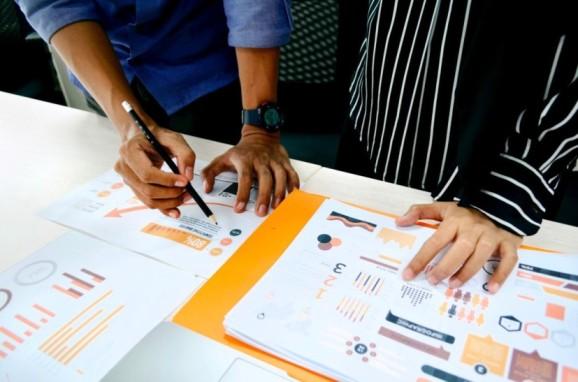Hard skills vs soft skills
Explore differences between hard skills and soft skills. Check out the definitions and practical examples of skills for your CV.

Our customers have been hired by: *Foot Note
Hard skills or soft skills? Anyone who has ever written a CV or prepared for an interview has thought about it at least for a moment. After all, skills are a huge part of a professional profile. They define what you can do, and therefore, what duties and tasks you are able to carry. Today, we’ll finally get down to the ultimate comparison of hard vs soft skills. We will check the definition of skills and show you lists of soft skills and hard skills examples. We will also tackle one of the most burning questions about skills: Which skills are more important in the job market, hard or soft? And to round off your knowledge of hard and soft skills, read on for sample interview questions.
Hard skills vs soft skills: Main differences
We have been learning about skills for CVs since we were teens. You may even remember from the school that skills were divided into soft and hard skills. But you’re not quite sure what’s what, don’t worry, it will all become clear in a moment.
Let’s start by saying that skills are learned behaviours and actions that are repetitive and are used to perform an activity. Now, as we said, skills, by basic definition, are divided into soft skills and hard skills. What does it mean?
What are soft skills
According to the soft skills definitions, they are transferable skills that can result from character traits, such as interpersonal skills, or be learned, such as organisational skills. They are not limited to one task and can be used in many situations.
We divide them into:
- Communication (social) skills
- Interpersonal skills and networking
- Methodological skills.
What are hard skills
Hard skills are non-transferable, specialised skills, specific to an industry or even a profession. These skills are acquired and practised with experience. On top of that, they often need to be validated with appropriate certificates and, unlike soft skills, are measurable. Unlike soft skills, hard skills are specific and only applicable to given exceptional situations, such as the ability to operate a certain machine.
Hard and soft skills comparison
| Hard skills | Soft skills |
|---|---|
| Job-specific, not transferable | Transferable |
| Measurable and often validated with tangible proof | Relatively unmeasurable, their assessment is subjective |
| Acquired through learning and experience | May result from character traits |
Hard skills examples
The list of hard skills can be endless. If you don’t believe it, just take a look at some CV examples. After all, every profession requires a special approach, the use of specific tools or the application of appropriate techniques. To make it a little easier for you to understand hard skills, we have compiled the following lists by different industries:
Hard skills for a data analyst CV:
- Knowledge of frameworks
- Proficiency in programming languages e.g. Java, Python
- Proficiency in databases
- Troubleshooting
- Agile methods
Hard skills for a mechanical engineer CV:
- Mechanical drafting
- Mechanical expertise including math, physics
- Proficiency in design/modelling software e.g. MathCad, FEA
- Proficiency in mechanical engineering tools
- Project management
Hard skills for a barista CV:
- Exceptional Customer Service skills
- Knowledge about coffee
- Latte art
- Operation of espresso machine and coffee frother
- Stock and inventory management
Hard skills for a retail employee CV:
- Cash handling
- Industry expertise
- Proficiency in using cash register
- Basic marketing skills
- Customer Service
Hard skills for a chef CV:
- Dining expertise
- Menu planning
- Budgeting and cost control
- Manual dexterity
- Knowledge of food safety and hygiene
Soft skills examples
When talking about soft skills, remember that they are not specific to any profession. Simply put, some soft skills may be more useful in one profession than in another. For example, interpersonal skills are definitely more useful in professions where contact with other people is of great importance, such as as a caregiver, than in a results-focused job such as data analysis.
Examples of soft skills that are worth having in your skillset:
- Attention to detail
- Attitude
- Ability to receive feedback
- Adaptability
- Punctuality
- Assertiveness
- Friendliness
- Communication
- Active listening
- Creativity
- Curiosity
- Work ethic
- Empathy
- Resourcefulness
- Leadership
- Collaboration
- Compassion
- Confidence
- Honesty
- Persuasion
- Physical stamina
- Coordination
- Good memory
- Observation
- Negotiation
- Networking
Other skills worth exploring
Hard skills and soft skills: CV example
Example 1: Hard and soft skills - Nursery teacher CV
Below you can see an example of a CV for a nursery teacher. As you might guess, this profession requires not only a great deal of subject knowledge but also the right attitude and patience. Rhys, a candidate looking for a new job, has included in their CV skills from both categories: soft and hard.
Hard skills
- Early Years expertise
- Inclusive learning techniques
- Hygiene control
Soft skills
- Enthusiastic communicator
- Behaviour management
- Positive reinforcement
- Diligent supervision
- Parent and caregiver relations
- Well-organised
- Good listener
Example 2: Hard and soft skills - Engineering manager CV
Another example is the CV of an engineering manager. Here, while undoubtedly skills and expertise play a huge role, managing people involves frequent interactions that would not be possible without the right interpersonal skills. See what soft and hard skills Martin has included in their CV.
Hard skills
- Compliance understanding
- Technology integration
- Resource evaluation
- Expenditure control
Soft skills
- Persuasive communication style
- Networking
- Interdisciplinary collaboration
- Strategic planning
What your skills say about you
It’s no secret that employers pay close attention to skills when reviewing candidates’ CVs. After all, your skills determine what kind of employee you are – and what kind of employee you might become in the future.
Your hard skills speak volumes about what you can do. This is the basic information an employer is looking for. Plus, as you already know, hard skills are measurable. This means that an employer can gain information not only about what you can do but also to what extent.
From this, they can determine whether you are a good fit for the role and the responsibilities that go with it.
Soft skills, on the other hand, say much more about you than you might expect. First and foremost, they represent your abilities to function in a group and interact with others. They also speak about your approach to work and give a general overview of what behaviour an employer can expect from you on a daily basis. Soft skills are crucial when working as part of a team and are extremely important for maintaining a good professional environment and efficient workflow.
Hard skills vs soft skills: Let’s talk about their relevance
The importance of hard skills
Hard skills are important because you need them to perform specific tasks correctly and in a timely manner.
These specialised skills can range from the fairly simple, the kind that can be learned in a few days or even hours, to the very complex, requiring a combination of knowledge and skills from multiple disciplines. Learning specific hard skills is a process, often quite long, involving both theory and practice. You can learn specific hard skills through courses, training, higher education, but also through peer observation and practice.
What’s more, if you have the right hard skills, you, as an employee, are able to work efficiently to ensure optimum results. And that, after all, is what it’s all about!
Hard skills are practised and developed with experience and are a well-known career booster. In simpler terms, the more you know and can do, the more irreplaceable you are. And the more irreplaceable you are, the more an employer wants you on their team.
However, don’t worry if your hard skill set is still not that diverse yet. That’s what entry-level jobs are for, to gain initial experience and polish your skills.
Why hard skills are important
- They represent what you can do
Mastering hard skills allows you to become a better specialist. By developing yourself in your field, you gain the necessary knowledge and skills to become an authority in your area of expertise. - The represent how well you can do it (your level of proficiency)
By acquiring certificates and other credentials, you enrich your CV and broaden your portfolio, which makes you a great asset to any company that will hire you. What is more, certificates are a tangible proof of the effort you put into self-improvement. - They increase productivity and efficient workflow
Finally, honing skills allows you to perform your duties efficiently, resulting in greater productivity and better performance at work.
The importance of soft skills
Soft skills are important because they shape your relationships with others. Soft skills in the workplace affect how you interact with others, but also how others interact with you. You can be the best expert in your field, but if you are unpleasant to deal with, can’t work as part of a team, can’t learn to communicate, network, and share successes and failures, you will find yourself to be your own biggest obstacle to success.
Why soft skills are important
- They help with growing the professional network
Soft skills are key to networking and establishing professional relations. Industry contacts allow you to learn from the experience of others and provide greater opportunities for development. - They improve productivity
Clear, open communication is not only a primary soft skill but also the basis for a smooth workflow. It helps to prevent possible confusion or misunderstanding, and the efficient transfer of information allows for optimum response times. - They promote a healthy, friendly work environment
People are what make up a workplace. A friendly, sincere atmosphere and the right balance of professionalism and friendliness create a place where you can work stress-free, even when deadlines are pressing.
Frequently asked questions about hard skills vs soft skills
Are soft or hard skills more important?
In 2022, employers and HR managers agree that hard skills and soft skills are equally important. Only the right balance of technical and transferable skills can ensure good performance and high productivity in a healthy working environment. The perception that hard skills are more important is definitely a relict of the past.
How to list hard and soft skills on CV?
When writing a CV, this is how you list hard and soft skills:
- Carefully read the job advertisement and the requirements.
- Make a list of your skills that match the requirements of the job posting.
- Add a Skills section to your CV. Place it under Experience or in a column on the side of your CV.
- List your hard and soft skills in the Skills section of your CV.
- List no less than 5 and no more than 10 hard and soft skills.
What are hard skills and soft skills examples?
5 Hard skills examples:
- Budgeting
- A/B testing
- Project management
- Foreign language
- Proficiency in specific software packages
5 Soft skills examples:
- Critical thinking
- Attention to detail
- Resilience and ability to work under pressure
- Communication
- Listening
What are common hard and soft skills interview questions?
Hard and soft skills interview questions:
- Describe a difficult work situation/project and how you handled it. (This question is about your problem-solving skills)
- What qualifications and experience do you have? (This question is about your hard skills specific)
- What is important to you when working in a team? (This question is about your interpersonal skills)
- Give an example of how your working conditions changed during the lockdown and how you adapted to them (This is a fairly new question that is designed to assess your adaptability)
- You notice that your manager is wrong. What do you do? (This question is about your honesty, communication and feedback)
Hard skills vs soft skills: What you need to know
Skills are a major factor in the labour market. Hard skills, or technical skills, define your industry knowledge and specialised skills. Soft skills, or transferable skills, are non-specific abilities that apply not only to your professional but also to your private life and define how you interact with others.
Skills from both categories are equally important and having the right mix of soft skills and hard skills is key to professional development.
For more articles on skills, as well as career and CV writing tips, visit our Blog.
Jagoda Jaskowicz
Senior Content Editor, SEO Content Writer
Meet Jagoda Jaskowicz – a certified copywriter, Polish language translator, and seasoned career adviser. Thriving on constant self-improvement, she eagerly stays ahead in her field. With a rich background working with individuals from over 50 countries, Jagoda has successfully completed more than a thousand projects in copywriting and translation.
*The names and logos of the companies referred to above are all trademarks of their respective holders. Unless specifically stated otherwise, such references are not intended to imply any affiliation or association with myperfectCV.










